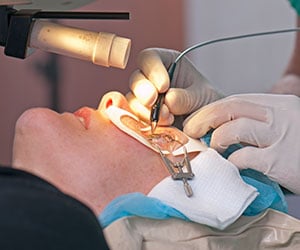If you wish to restore your eye sight and achieve 20/20 vision, consider speaking with Dr. Jean E. Keamy for Laser Vision Correction! Dr. Keamy can review your case, answer any questions you have, and help you determine whether you are a candidate for treatment. Call 508.836.8733 today to reach Eye & Laser Centre in Westborough, MA.
Patient Testimonial
What People Say About Us!
"I can see clearly now. Had LASIK Eye Surgery. Everything went as smooth as can be. Dr. Keamy and her staff were all helpful, polite, and clear. They explained my options, the procedure, risks, and costs clearly. Within a few weeks of recovery my eyesight was better than it ever was with contacts or glasses. I recommend them highly."
What is laser vision correction?
Laser vision correction, or laser eye surgery, is a surgical procedure performed on the cornea. A non-thermal beam is used during the surgery to reshaped the surface of the eye in order to improve vision.

There are two popular types of laser eye surgery: LASIK surgery and PRK. During LASIK surgery, a thin outer layer of the cornea is lifted to expose the tissue, and is then replaced after the procedure. In PRK, this layer is removed and discarded. The outer layer, known as the epithelium, will heal over the next few days following surgery. Undergoing laser vision correction in Westborough, MA is a great option for people who are tired of poor vision and do not want to use traditional methods of vision improvement.
Types of Laser Vision Correction Procedures
- Custom LASIK
- Monovision LASIK
- Intralase LASIK
- Photorefractive Keratectomy (PRK)
Custom LASIK
Custom LASIK, is the standard in laser vision correction. It offers the most accurate, individualized results for each patient. This FDA-approved procedure uses three-dimensional measurements of the eye to guide the laser as it reshapes the cornea and corrects your vision.

Custom LASIK Benefits
Custom LASIK benefits patients benefit by achieving 20/20 vision, with many patients obtaining vision that is better than 20/20, a goal that has not been achieved with traditional LASIK, glasses, or contacts. Custom LASIK also reduces the risk of poor night vision and glare, side effects that are common with traditional LASIK.
Custom LASIK Procedure
During the custom LASIK procedure, a wavefront device transmits a ray of light into your eye that is received and arranged into a unique pattern to create a 3-D map of your eye, including both lower and higher order aberrations. This information is transferred to the laser and applied to your eye’s position, allowing the doctor to achieve customized vision correction for each patient.
Watch the following videos to learn more:
Monovision LASIK
Monovision LASIK surgery corrects one eye for distance and the other eye for near vision, eliminating or reducing the need for patients, with presbyopia, to rely on glasses or contacts. Patients are able to retain their near and distance vision after LASIK surgery. If you are over the age of 40 and wear bifocals or reading glasses, monovision LASIK may be an option.
Monovision LASIK Benefits
The ability to focus our eyes on objects at different distances, also known as accommodation, changes as we age. The lenses of our eyes lose their flexibility and begin to harden as a part of the natural aging process called presbyopia, making the accommodation more difficult to achieve. People with symptoms of presbyopia often need bifocals or two different pairs of glasses; one for distance and the other for near vision. Patients who undergo conventional LASIK may still need glasses to correct for presbyopia after the procedure because LASIK does not treat presbyopia — LASIK reshapes the cornea which does not affect the lens. With conventional LASIK, both eyes are corrected for distance vision, leaving some patients in need of glasses for reading and other daily activities that require near vision. Monovision LASIK preserves near and distance vision without this need for corrective eyewear. The LASIK procedure optimizes one eye for distance sight and the other eye for near sight. With practice, patients are able to adjust their vision to accommodate between distances.
IntraLase LASIK
The IntraLase method provides a blade-free approach to laser vision correction. IntraLase uses laser energy to create a customized flap based on the shape of the eye, providing the patient with the best possible outcome.

Intralase LASIK Benefits
IntraLase offers patients many benefits over the traditional LASIK procedure, including improved accuracy and customization, a shorter recovery time and a reduced risk of flap-related complications. The IntraLase technique also allows for complete customization of the LASIK procedure to accommodate each patient’s individual vision needs. All elements of surgery, including the size, location and angle of the flap, can be customized for the most precise results.
What is Photorefractive Keratectomy (PRK)?
Photorefractive keratectomy, or PRK, is a laser vision correction procedure that reshapes the cornea to correct mild to moderate conditions of:
- Nearsightedness, or myopia
- Farsightedness, or hyperopia
- Astigmatism
PRK Benefits
PRK uses an excimer laser to remove a small amount of the anterior portion, or front, of the cornea to correct refractive errors. Unlike the LASIK procedure, where a flap is created to access the cornea, PRK removes the epithelial, or outer layer, of the cornea so that it can be reshaped with an excimer laser to remove tissue from the surface. This process flattens the cornea and achieves the corneal steepening needed for vision correction.
Watch the following videos to learn more:
PRK Patient Testimonial

FAQ
What Are The Risks Of Laser Vision Correction?
Similar to other types of procedures, there are risks you need to be aware of. There are a few side effects that are commonly experienced. These side effects can include dry eyes and seeing glares. They typically last a few days before fading away on their own. However, other risks could negatively impact you, which include:
• Undercorrections
• Overcorrections
• Astigmatism
• Corneal ectasia
• Vision regression
• Vision loss
Vision regression is when a patient's vision slowly goes back to normal. Vision loss is an infrequent complication that can occur with laser vision correction.
What Are The Requirements For Candidacy?
Before anyone can receive laser vision correction, they must first be deemed a suitable candidate. You are a candidate if you meet the following criteria:
- You are 18 years of age or older.
- You do not have any underlying health conditions, such as diabetes.
- You are not on any medication that affects the immune system.
- You do not have any type of eye injury or infection.
During your consultation with Dr. Keamy, you must inform her of any eye conditions you have, such as lazy eye or muscle imbalance. Furthermore, if you are pregnant or nursing, you will have to wait until the baby is born before undergoing this operation.
What Are The Contraindications?
In addition to the risks, some contraindications can impact your recovery and increase the chance of experiencing a complication. It is not recommended to have this procedure performed if you have an autoimmune disorder, have a weak immune system, or currently have a corneal disorder. It is also not a good idea to get laser vision correction if you have chronic dry eyes, take medicine that impacts your vision, or have an eye injury.
Contact Us Today
If you want laser vision correction, Dr. Keamy is here to help! Contact us at 508-836-8733 to schedule an appointment today!
Contact us to learn more about Laser Vision Correction
